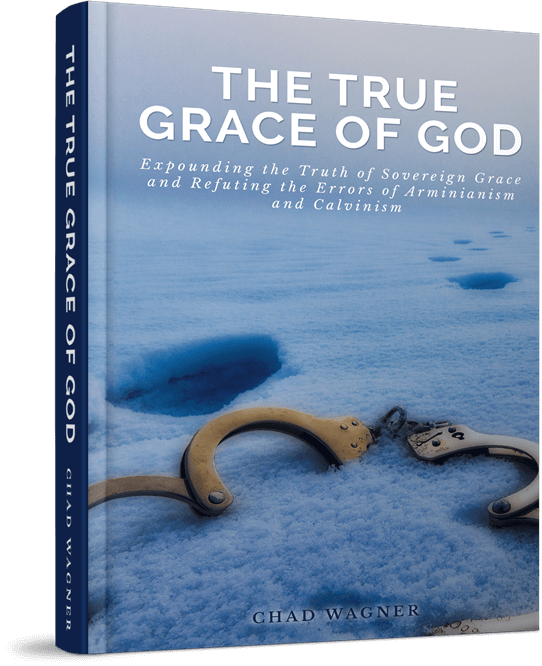What is meant by “justification” and just how does a man become justified in God’s sight? As one reads through the Bible, there appear to be contradicting statements as to just how a man is justified in the sight of God. For instance we are told in Romans 3:20 that “by the deeds of the law there shall no flesh be justified in his sight” and in Romans 3:24, we read that we are “justified freely by his grace through the redemption that is in Christ Jesus” and again in Romans 5:9, we are told that “being now justified by his blood, we shall be saved from wrath through him”. We likewise read that “by the righteousness of one the free gift came upon all men unto justification of life” (Rom 5:18). From these verses, it would appear that one becomes justified by a free act of grace alone through the shed blood of the Lord Jesus Christ, and this, my friends, is the truth.
But then, as we read in these same three chapters of Romans, we see that “a man is justified by faith without the deeds of the law” (Rom 3:28), that God “shall justify the circumcision by faith, and uncircumcision through faith” (Rom 3:30), that God is “the justifier of him which believeth in Jesus” (Rom 3:26), and that Abraham was not justified by works, but by his faith (Rom 4:2-3). From these verses, it would appear that one is justified by his faith in Jesus and not by his works, and this, my friends, is also the truth.
But then, to complicate the matter further, we read in the book of James the question posed: “Was not Abraham our father justified by works, when he had offered Isaac his son upon the altar?” (Jam 2:21). The hopes of many professing Christians today notwithstanding, the answer to this question is yes, Abraham was justified by his works as James goes on to say: “Ye see then how that by works a man is justified, and not by faith only” (Jam 2:24). From these verses, it would appear that one is justified by his works, and this, my friends, is also the truth.
How then can all three of these statements be true given that there are no contradictions in the Bible? How can it be true that a man is justified by the grace and blood of Jesus Christ alone and at the same time be true that a man is justified by his faith and not his works, and yet also at the same time be true that a man is justified by his works?
The answer comes when we approach the study of God’s word the way that God’s word itself tells us to study it. First of all, like the priests and Levites of old, if we are to understand the word of God, it is by reading it distinctly and giving the sense of the words, just as we read in Nehemiah 8:8, “So they read in the book in the law of God distinctly, and gave the sense, and caused them to understand the reading.” To read distinctly is to read the words “In a distinct or separate manner; separately, individually, severally” (OED). Once the words are read distinctly, we then need to give the sense of them. Sense is defined as “The meaning or signification of a word or phrase; also, any one of the different meanings of a word, or that which it bears in a particular collocation or context” (OED). Therefore in order to understand the reading, we have to read each word carefully and separately and then give the meaning of the words using a good dictionary.
Secondly, in order to understand this seeming contradiction, we need to study the Bible the way the Holy Ghost teaches by “comparing spiritual things with spiritual” (1Co 2:13). In other words we need to compare what the Bible says elsewhere on a given topic to fully understand it. Thirdly, we need to be doing what the minister of God is to do when he studies the word and be “rightly dividing the word of truth” (2Ti 2:15). In other words we need to make divisions where the Bible makes divisions and not try to ram a square peg in a round hole, so to speak.
Now that we know how to study the Bible the way the Bible says to, let’s apply this method to this question of justification. (All definitions are from the Oxford English Dictionary.)
Justified – 1. Made just or right; made or accounted righteous; warranted; supported by evidence;
Made – 1. a. Artificially constructed or produced, artificial as opposed to ‘natural’.
Artificial – 1. Made by or resulting from art or artifice; contrived, compassed, or brought about by constructive skill, and not spontaneously; not natural.
Just – 1. That does what is morally right, righteous. just before (with) God or, simply, just: Righteous in the sight of God; justified.
Accounted – 1. Counted, reckoned, considered.
Righteous – 1. a. Of persons: Just, upright, virtuous; guiltless, sinless; conforming to the standard of the divine or the moral law; acting rightly or justly.
So as we see from the definition of justified, the primary meaning can mean two things. First, it can mean someone has been made just or right, or by inserting the meanings of made, just, and artificial, it means that a person was unnaturally caused to be righteous (guiltless, sinless). Secondly, justified can mean that a person is accounted (counted, reckoned, considered) righteous.
As hopefully you have just seen, these definitions open up the topic of justification in Romans 3-5 and begin to unwind the supposed contradictions. Now let’s look at the afore mentioned verses and see how they harmonize with each other and give a complete view of justification – the whole way from Christ’s justifying faith and work on the cross which made His people righteous, down to their faith and works with show the evidence that they are justified.
Before we look at those verses in Romans 3-5, lets look at a few verses that plainly state just how Jesus Christ justified His people. The Bible speaks of four things that Jesus used to justify His elect:
- His Grace:
“Being justified freely by his grace through the redemption that is in Christ Jesus” (Rom 3:24)
“That being justified by his grace, we should be made heirs according to the hope of eternal life.” (Tit 3:6)
- His Faith:
“Knowing that a man is not justified by the works of the law, but by the faith of Jesus Christ, even we have believed in Jesus Christ, that we might be justified by the faith of Christ, and not by the works of the law: for by the works of the law shall no flesh be justified.” (Gal 2:16)
- His Blood:
“Much more then, being now justified by his blood, we shall be saved from wrath through him.” (Rom 5:9)
- His Knowledge:
“He shall see of the travail of his soul, and shall be satisfied: by his knowledge shall my righteous servant justify many; for he shall bear their iniquities.” (Isa 53:11)
So we now see clearly that a man is justified, in the sense of being made just, right, and righteous, by the grace, faith, blood, and knowledge of our Lord Jesus Christ alone.
On the other hand, let’s look at how a man is justified in the sense of being accounted righteous. The Bible shows that the way a person is accounted (counted, reckoned, considered) to be righteous is by their faith. Hebrews 11:1 tells us that “faith is the substance of things hoped for, the evidence of things not seen”; so we see that faith is an evidence of something that is not seen with the natural eye. Consider the following verses that show that a man’s faith is what accounts him to be righteous:
Romans 4:3 – For what saith the scripture? Abraham believed God, and it was counted unto him for righteousness.
Romans 4:9 – Cometh this blessedness then upon the circumcision only, or upon the uncircumcision also? for we say that faith was reckoned to Abraham for righteousness.
Romans 4:20-22 – He staggered not at the promise of God through unbelief; but was strong in faith, giving glory to God; And being fully persuaded that, what he had promised, he was able also to perform. And therefore it was imputed to him for righteousness.
Romans 4:24 – But for us also, to whom it shall be imputed, if we believe on him that raised up Jesus our Lord from the dead;
James 2:23 – And the scripture was fulfilled which saith, Abraham believed God, and it was imputed unto him for righteousness: and he was called the Friend of God.
So we see from these verses that a man is justified, in the sense of being accounted righteous, by putting his faith and belief in God and His promises.
These two concepts of justification are brought together in one verse that sums it up and makes it so plain. “But to him that worketh not, but believeth on him that justifieth the ungodly, his faith is counted for righteousness” (Rom 4:5). Notice how both justifications are linked together in this one verse. Jesus is the one who justifies the ungodly by his grace, faith, blood, and knowledge alone, and when we believe on Him who justified us, we are then justified in the sense of being accounted righteous, just as the verse says “his faith is counted for righteousness.” If a person thinks that his personal faith is what made him justified, in the sense of making him just, right, and righteous, which is something only Jesus can do, then his personal faith is a work that he is doing to try to acquire righteousness and his reward is reckoned of debt, not of grace (Rom 4:4), because God would be discharging a debt that He owed that man for the work that he had done (exercising his faith) to acquire righteousness. But on the other hand, if a man has faith in the finished work of Christ who justified him and doesn’t believe that his faith is getting him the righteousness, but rather showing that Jesus made him righteous, then his faith is not work that God is indebted to repay, but rather is counted for righteousness (it shows that he is righteous).
Now with what we have learned about the two-fold nature of justification, let’s examine the verses that deal with justification in Romans 3-5 and see in which sense they are to be understood.
We read in Romans 3:20, “Therefore by the deeds of the law there shall no flesh be justified in his sight: for by the law is the knowledge of sin.” We have already seen that Abraham’s faith was counted for righteousness and that his faith was proven by his works (Jam 2:21-24), so in a sense Abraham was justified by deeds (works) of the law (i.e. keeping God’s commandments). In that this verse says that no flesh shall be justified by the works of the law, the justification there spoken of must be speaking of the justification that Christ accomplished on the cross, which no amount of law keeping on our part could accomplish.
Paul goes on to explain that this justification is the righteousness of God without the law (Rom 3:21), it is by the faith of Jesus Christ, and that it is “unto all and upon all them that believe” (Rom 3:22). It is not because of our faith, but rather because of Jesus’ faith, as the verse says, and our faith is the evidence or the token that the righteousness of God is upon us. This justification was completed “freely by his grace through the redemption that is in Christ Jesus” (Rom 3:24).
So great was God’s faith that Jesus Christ would redeem all of those He gave him to save, both who lived before and after the cross, that He (the Father) could forbear the punishment of the sins of His elect who died before the cross until Jesus came in time and suffered as a propitiation for their sins. In other words, God had such faith in Christ’s blood, which would pay for the sins that were committed in the past, that he could remit those sins before the sacrifice of Christ was made because He knew it was as good as done, for we read that God “calleth those things which be not as though they were” (Rom 4:17). This is what Paul was speaking of in Romans 3:25 when he wrote, “Whom God hath set forth to be a propitiation through faith in his blood, to declare his righteousness for the remission of sins that are past, through the forbearance of God.”
Concerning the same righteousness that God declared for the sins that were past, Paul goes on to write that God now declares His righteousness: that He is the justifier of him that believeth in Jesus (Rom 3:26, also see Act 13:39). This verse states that God is the justifier of believers, but it does not say that God justified them because of their belief; for when God justified them they were certainly not believers, but rather His enemies (Rom 5:9-10). As has been stated already, their belief is the evidence, the token that is counted for righteousness, which shows that they are those whom God justified.
Since Paul just proved that a person is justified by God’s faith in Jesus’ blood (Rom 3:25), by the faith of Jesus Christ (Rom 3:22), and by God’s grace through Christ’s redemption, he then asks, “Where is boasting then?” (Rom 3:27). What right does any man have to boast when justification is due entirely to Jesus’ blood, faith, and grace? Where is boasting then? It is excluded. How?, by the law of faith (Rom 3:27). Faith believes that justification is only by the grace of God without the works of the law on the sinner’s part. Faith understands that a man’s faith is counted for righteousness, not what produces his righteousness.
Based on all this, Paul concludes that a man is justified by faith (Rom 3:28) and that God shall justify the circumcision by faith, and the uncircumcision through faith (Rom 3:30). In what sense are men justified by faith? Men are justified, in the sense of being made righteous, by the faith of Christ (Rom 3:22; Gal 2:16), and by God’s faith in Christ’s atoning work (Rom 3:25). But men are also justified, in the sense of being accounted righteous, by their own faith in God (Rom 4:3; Rom 4:24).
This two-fold justification gives us peace with God, just as Paul said in Romans 5:1, “Therefore being justified by faith, we have peace with God through our Lord Jesus Christ.” When we were justified by Christ’s faith (Gal 2:16), we who were once His enemies (Rom 5:10) were made to be at peace with Him by the blood of His cross (Col 1:20). But in the other sense of being justified, when we put our faith in Christ which accounts us to be righteous, we are filled “with all joy and peace in believing” (Rom 15:13).
That is the two-fold nature of justification: God’s sovereign grace makes a man righteous and man’s faith is the evidence that shows that he is righteous.








